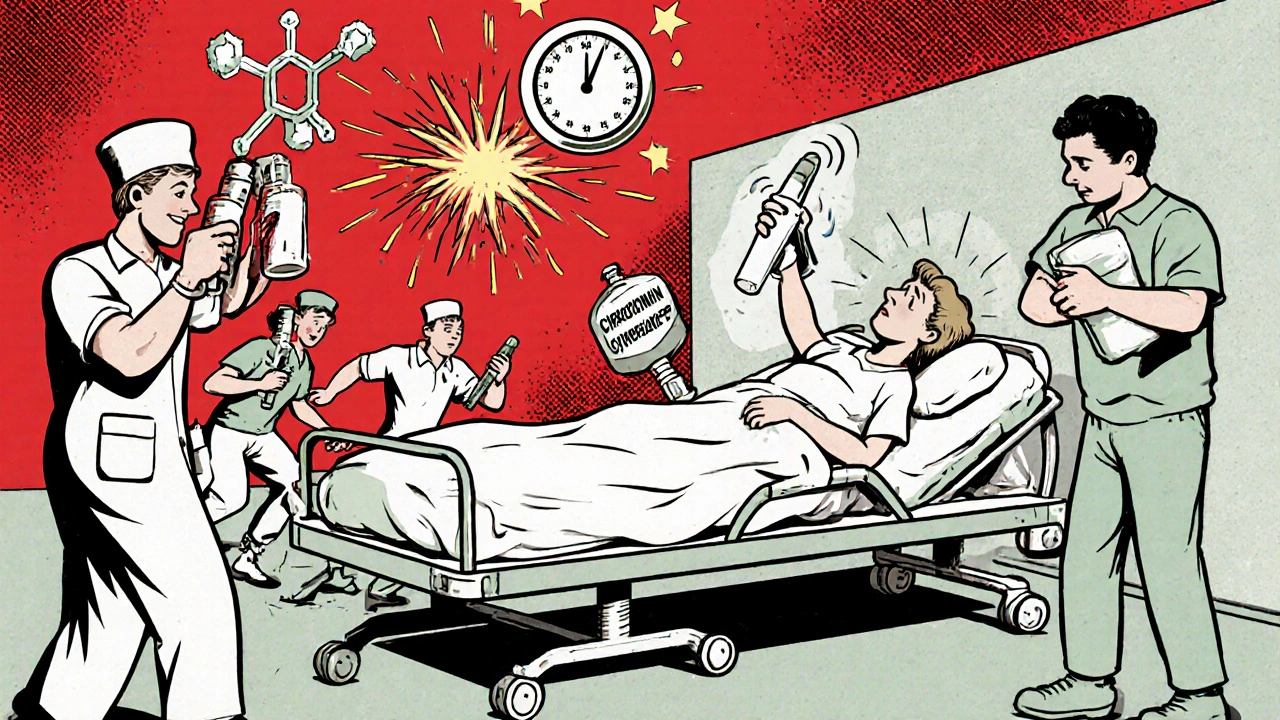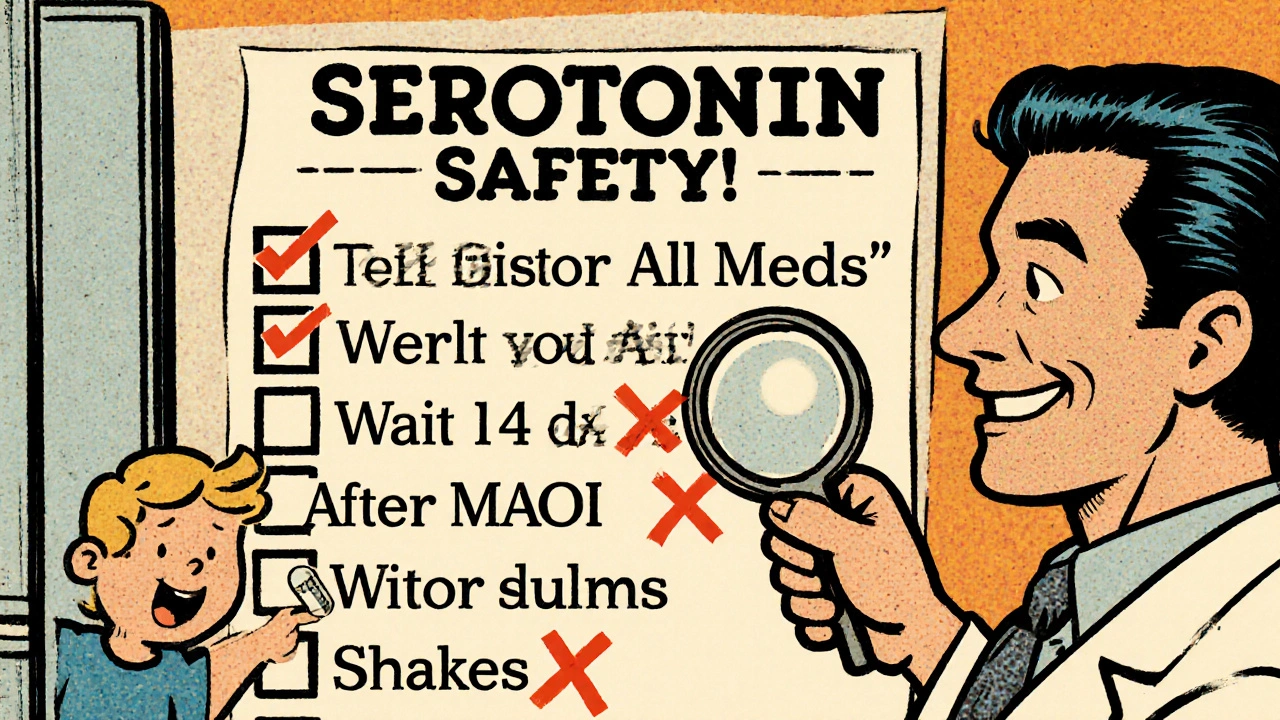Serotonin Syndrome: Causes, Symptoms, and Emergency Response for Medications
 Nov, 7 2025
Nov, 7 2025
Serotonin Medication Safety Checker
When you start a new medication or add one to your routine, you expect relief-not a medical emergency. But for some people, combining common drugs can trigger a dangerous condition called serotonin syndrome. It doesn’t happen often, but when it does, it can turn deadly within hours. And too often, it’s missed because the early signs look like anxiety, the flu, or just side effects.
What Exactly Is Serotonin Syndrome?
Serotonin syndrome isn’t an allergy. It’s a toxic buildup of serotonin in your nervous system. Serotonin is a natural chemical that helps regulate mood, sleep, and digestion. But when too much of it floods your brain and body-usually because of how medications interact-it overstimulates nerve cells. This leads to a cascade of physical and mental symptoms that can escalate fast. The condition was first identified in the 1960s when people taking MAOIs (a type of antidepressant) also took tryptophan supplements. Today, it’s far more common because so many people take multiple serotonergic drugs. About 80% of cases happen when someone is on two or more medications that increase serotonin. And the risk spikes within 24 hours of starting a new drug or increasing a dose.What Medications Can Cause It?
You might be surprised how many everyday medications can contribute. The most dangerous combinations involve:- SSRIs like fluoxetine (Prozac), sertraline (Zoloft), and escitalopram (Lexapro)
- SNRIs like venlafaxine (Effexor) and duloxetine (Cymbalta)
- MAOIs like phenelzine (Nardil) and tranylcypromine (Parnate)
- Triptans for migraines, such as sumatriptan (Imitrex)
- Opioids like tramadol (Ultram), fentanyl, and meperidine (Demerol)
- Illicit drugs including MDMA (ecstasy), cocaine, and LSD
- Supplements like St. John’s wort and tryptophan
What Are the Symptoms?
Symptoms show up in three main areas: your muscles, your body’s automatic functions, and your mind. The Hunter Criteria, used by emergency doctors worldwide, identify the most reliable signs:- Spontaneous muscle contractions (clonus)-especially in the ankles
- Agitation or confusion
- Heavy sweating without exertion
- Shivering or tremors (often the first sign)
- Overactive reflexes (hyperreflexia)
- High body temperature (above 38°C or 100.4°F)
- Fast heart rate, high blood pressure
- Diarrhea

How Serious Is It?
Mild cases might just feel uncomfortable. But severe serotonin syndrome is life-threatening. Temperatures can soar past 41.1°C (106°F). Your muscles can lock up. Your heart races out of control. Blood pressure crashes or spikes. You can go into seizures, kidney failure, or disseminated intravascular coagulation-a condition where your blood clots everywhere at once. About 2-12% of severe cases end in death. And here’s the scary part: if you don’t get treated within the first six hours, your risk of dying triples. Studies show nearly 30% of hospitalized cases need intensive care. Many patients are misdiagnosed-mistaken for having neuroleptic malignant syndrome, heatstroke, or even a psychiatric crisis.What Should You Do in an Emergency?
If you suspect serotonin syndrome, stop all serotonergic drugs immediately. That’s step one. Then call emergency services or go to the ER. Don’t wait. Don’t text your doctor. Don’t hope it’ll pass. In the hospital, treatment depends on severity:- Mild cases: Benzodiazepines like lorazepam calm agitation and reduce muscle spasms. Symptoms usually resolve in 24-72 hours with rest and fluids.
- Moderate to severe: Cyproheptadine (Periactin) is given as an antidote. It blocks serotonin receptors. Dosing starts at 12 mg, then 2 mg every 2 hours as needed, up to 32 mg in 24 hours.
- Critical cases: Cooling measures for hyperthermia-ice packs, cold IV fluids, fans. Intubation if breathing fails. Dantrolene to relax muscles if cooling alone doesn’t work. Continuous monitoring in the ICU.
Why Do Doctors Miss It?
Because the symptoms look like so many other things. A tremor? “Just nerves.” A fever and diarrhea? “Stomach flu.” Agitation? “Anxiety flare-up.” One doctor on Reddit shared how they missed it in a 45-year-old woman on sertraline and tramadol. She came in with agitation and overactive reflexes. They thought it was viral. Twelve hours later, she had a 40.5°C fever and ended up in the ICU. Patients report similar stories. One person on Drugs.com said their doctor told them tremors from Prozac were “normal”-until they added Ultram and ended up in the hospital with a 104°F fever. The problem isn’t just ignorance. It’s how common these drugs are. Nearly 1 in 5 Americans now takes an antidepressant. That’s a lot of people on medications that can interact. And most primary care providers don’t have time to cross-check every pill in a patient’s cabinet.
How to Prevent It
Prevention is simple-but only if you’re proactive:- Always tell every doctor and pharmacist about every medication you take-including OTC drugs, supplements, and recreational substances.
- Wait at least 14 days after stopping an MAOI before starting an SSRI. For fluoxetine (Prozac), wait five weeks-it sticks around longer.
- Ask your doctor: “Could this new medication interact with what I’m already taking?” Don’t assume they checked.
- Know your warning signs. If you feel shaky, sweaty, or mentally off after a new drug, treat it like a red flag-not a side effect.
- Use digital tools. Many pharmacies now flag dangerous interactions. But don’t rely on them alone. They get it wrong 43% of the time.
What’s Changing?
Serotonin syndrome cases have jumped 34% over the last decade as antidepressant use climbed. New synthetic drugs like bath salts and fake weed are adding to the risk. And drug interaction databases are expanding-next year’s guidelines will list 47 more medications that can trigger it. Researchers are also testing new treatments. One experimental drug, PCPA, blocks serotonin production at its source. Early animal studies cut symptom severity by 63%. It’s not available yet, but it shows we’re moving beyond just stopping drugs and giving antihistamines.Final Takeaway
Serotonin syndrome is rare-but it’s not rare enough. With so many people on antidepressants, painkillers, and migraine meds, the chances of a dangerous interaction are higher than ever. The good news? You can prevent it. You can spot it. And you can save a life-maybe even your own-by speaking up.If you’re taking more than one medication that affects serotonin, keep a list. Memorize the first signs. Tell your doctor before you start anything new. And if you feel something’s wrong-trust it. Don’t wait for a fever. Don’t wait for muscle spasms. Tremors and sweating aren’t normal. They’re your body’s emergency alarm.
Can serotonin syndrome happen from one medication?
Rarely. Most cases involve two or more serotonergic drugs. But very high doses of a single drug-like taking too many SSRIs or using large amounts of MDMA-can cause it alone. Still, the biggest risk comes from drug combinations.
How long does serotonin syndrome last?
Mild cases usually clear up in 24 to 72 hours after stopping the triggering drugs. Severe cases may take longer, especially if complications like organ damage occur. Some medications, like fluoxetine, stay in your system for weeks, so symptoms can linger or return if another serotonergic drug is taken too soon.
Is serotonin syndrome the same as neuroleptic malignant syndrome?
No. Both cause high fever and muscle rigidity, but they’re different. Serotonin syndrome features tremors, clonus, and overactive reflexes. Neuroleptic malignant syndrome has “lead-pipe” rigidity-stiff, unyielding muscles-and no clonus. Treatment is also different: serotonin syndrome responds to cyproheptadine; NMS needs dantrolene and bromocriptine.
Can I get serotonin syndrome from herbal supplements?
Yes. St. John’s wort, tryptophan, and even certain energy boosters can raise serotonin levels. Combining them with antidepressants or migraine meds can trigger symptoms. Many people don’t realize supplements are drugs too.
What should I do if I think I have serotonin syndrome but my doctor says it’s not?
Go to the emergency room. Serotonin syndrome is time-sensitive. If your symptoms are worsening-especially if you have fever, tremors, or confusion-don’t rely on a second opinion. ER doctors are trained to recognize it using the Hunter Criteria. It’s better to be checked and cleared than to wait until it’s too late.

Jim Oliver
November 8, 2025 AT 14:25Stop calling it "side effects." It's a toxin. It's a medical emergency. If you're on SSRIs, don't even think about that OTC migraine med without checking. Seriously. This isn't "maybe"-it's "when."
William Priest
November 8, 2025 AT 17:12ive been on cymbalta for 3 yrs and took a 5hr energy drink with 5htp once. felt like i was vibrating inside my skin. thought i was having a panic attack. turned out to be mild syndrome. doc said "youre lucky you didnt die". yeah thanks for the reassurance bro.
Ryan Masuga
November 9, 2025 AT 11:42Three days later I was in the ER with a 103 fever. They diagnosed it within an hour. Cyproheptadine saved me. Please, if you're on any antidepressant and add anything new-stop. Wait. Ask. Don't assume it's normal. You're not overreacting.
Jennifer Bedrosian
November 11, 2025 AT 10:31LIKE WHY DO WE LET PEOPLE TAKE SUPPLEMENTS LIKE THEYRE CANDY AND THEN ACT SHOCKED WHEN THEY MELT YOUR BRAIN
Lashonda Rene
November 12, 2025 AT 13:35Andy Slack
November 14, 2025 AT 05:00I'm sharing this with my entire family. My aunt is on Prozac and takes CBD oil. She has no idea. I'm sending her this link right now.
Rashmi Mohapatra
November 15, 2025 AT 11:03Abigail Chrisma
November 17, 2025 AT 06:19One thing I’d add: if you're on an SSRI and your doctor suggests a new painkiller, always ask: "Is this serotonergic?" If they don’t know, say: "I’ll check with my pharmacist first." You are your own best advocate. This isn’t paranoia-it’s prevention.
Ankit Yadav
November 17, 2025 AT 17:52Doctors need better training. Pharmacies need better systems. Patients need better education. But until then, read the fine print. Ask twice. Don't trust algorithms. They miss 43% of cases.
Meghan Rose
November 18, 2025 AT 06:59Why do we make people feel crazy for listening to their bodies? Why do we call it "anxiety" instead of "danger"? I'm not dramatic. I'm just not dying because someone didn't check a drug interaction database.